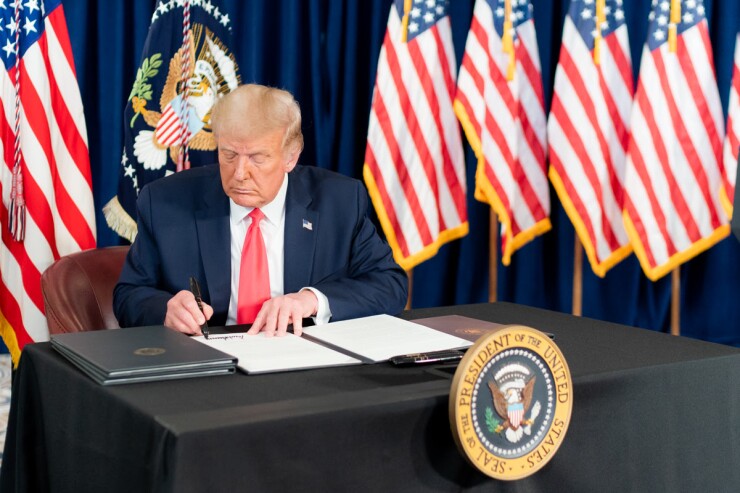President Donald Trump’s order to delay collection of payroll taxes thrusts a dilemma on U.S. companies: continue withholding the money from workers expecting bigger paychecks or pass it on and potentially put themselves or their employees at risk of a big end-of-year bill from the IRS.
Trump signed an order over the weekend deferring the due date for payroll taxes, which employers deduct from paychecks and submit to the IRS on behalf of workers. The order just defers the taxes from Sept. 1 to the end of December. The bill will come due unless Congress agrees to forgive the tax debts.
Companies have just weeks to figure out what their legal responsibility is and then they may have to reprogram payroll systems to accommodate the changes, which defer the due date for those earning less than $4,000 bi-weekly, or about $104,000 a year.

Employers should be cautious because the IRS could go after both a company and its employees if they don’t pay the taxes when the executive order expires, said Matt Foreman, an independent tax lawyer based in New York. Late payments would be subject to interest and penalties.
‘Keep collecting’
“My advice is keep collecting and keep remitting to the IRS. Tell your employees exactly what [you’re] doing, and why you’re doing it,” he said.
That’s the decision that OneAmerica Financial Partners Inc., an Indianapolis-based insurance holding company with 2,300 employees across the country, made unless there are further directives from Congress.
“The more I read about this, it’s a holiday. Unless it gets passed by Congress or signed into law, people are going to be responsible for making up the FICA difference when they file their tax return,” said Jon Schausten, director of payroll and human resources information systems at OneAmerica. He was referring to the Federal Insurance Contributions Act, the formal name of the payroll taxes that fund Social Security and Medicare.
“I don’t want to be the bad guy saying, ‘Hey, you owe all this extra money’ when you file your return,’” he said.
Few large employers have said how they plan to deal with it. Walmart Inc. spokesman Randy Hargrove said the retailer is waiting for more guidance before deciding what to do. Macy’s Inc. spokesperson Cheryl Heinonen said in a statement that the company is still “reviewing the order and our options.”
Schausten said he doubted many companies would implement the executive order in the current climate.
“I don’t think it makes sense from a liability and risk standpoint,” he said. “The short-term gain doesn’t outweigh the burden at the end of the year.”
It’s also incredibly difficult for many employers to reprogram their payroll systems, said Pete Isberg, a vice president at payroll processor Automatic Data Processing Inc. A few companies may be able to have systems ready to go by Sept. 1, but it will take most longer — possibly months — to make the changes that will require more clarifications from the Treasury Department and IRS about how the executive order works.
“There are a lot of things that aren’t clear. Is this optional? Do employers have an option? Do employees have an option? Do employees still get Social Security credit if they don’t pay anything in? How do you define compensation?” said Edward Karl, vice president of taxation at the American Institute of Certified Public Accountants.
Treasury guidance
The Treasury Department is working on guidance to implement the order. Employers are hoping that will clarify whether — if they pass on the tax savings to employees — they will still be on the hook for paying when the taxes come due or if the onus shifts to employees.
The amount of deferred taxes could be as much as $2,232 for someone earning up to $4,000 every two weeks, according to Isberg. That could cause problems for taxpayers who aren’t used to paying their own payroll taxes directly.
“It’s not a tax cut, it’s not a rebate, but you will have folks who will view it as a tax cut,” said Marc Gerson, a member at law firm Miller & Chevalier Chartered. “It will almost be a surprise to them at the end of the year, and that is something that could force congressional action to extinguish the debt.”
— With assistance from Michael Bologna, Jordyn Holman and Nic Querolo




